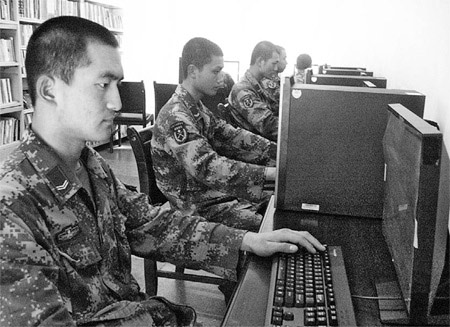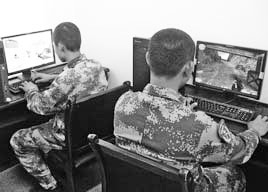Of strikes and counter strikes
 |
|
PLA soldiers stationed in the frontier area of Shannan prefecture, Tibet autonomous region, spend their spare time playing video games, which help the young soldiers adapt to military life. Photos by Lin Jing / China Daily |
In a 12-square-meter room, eight young men dressed in camouflage are staring hard at their computer screens. As the onscreen animated figures holding rifles fire from time to time, they press the controls on the keyboard and move the mouse in feverish excitement.
While gunshots fill the virtual world, the only sounds to punctuate the quiet of the room are the mouse clicks.
"Xiao Liu got me!" shouts one of them suddenly, leaning back in his chair. "Why am I always the first one to die?"
"I see him! Anyone a sniper? Cover me!" rings out another voice.
These are not school or college students sneaking away for a bout of PC games in the dormitory. Rather, they are People's Liberation Army (PLA) soldiers with a military company stationed in the frontier area of Shannan prefecture, Tibet autonomous region.
The soldiers have taken to PC games like a duck to water ever since the 20 computers were installed in 2009.
"Most of us are players of Counter-Strike (CS)," says Ye Yanze, 21. "We all like it very much."
CS is a tactical first-person shooter video game, where players are divided into counter terrorists (CT) and terrorists.
Ye, who comes from Guangdong province, joined the army after completing vocational school.

While playing, he always chooses to be a CT, and his favorite weapon is the AK-47 assault rifle. "It is so powerful," he says.
Despite his strong interest in the game, he admits he is just a beginner.
"My personal best record is 19 killings versus 18 deaths," Ye says, shyly. "I am usually the one to get killed first in the game."
But there are also the pros, who like to challenge players from other squads.
Lai Haitao, 23, is one of the top players.
"It was my lucky day," Lai says, recalling his personal best of 29 killings versus three deaths. "I think I need to be in good form to give my talents full play."
He first played CS while still in junior high, and continued to pit his skills against those of his roommates through college.
Two years ago, he quit college in Guangdong province and joined the PLA, to improve his willpower and physical endurance, and become "a real man".
Lai says video games such as CS require quick reactions and also help foster a team spirit.
"Team members have to cooperate with each other to accomplish a task. Playing a game helps us get to know one another better and we often end up becoming very good friends. This is of great help when discharging our real-life duties."
Video games also pave the way for better communication, and help eliminate small differences among the soldiers.
"Those harboring minor disagreements often make an appointment to meet in the computer room to fight it out by playing video games," Duan Qihong, 22, says.
Their favorite battle setting is "Iceworld", where anyone can choose a weapon from an assortment lying on the snow and start shooting at the enemy.
"Win or lose, the outcome is quick and direct," Duan says.
"After the game, everyone remains good friends - there are no losers."
Zheng Jianjun, the company's political instructor, is one of the best players and also the organizer of the weekly CS competition.
"I like to use the sniper in CS," says Zheng. "It takes only one shot to kill your enemy."
Every week, he organizes different squads to fight against each other in the video game.
Soldiers form groups of four and determine each team's role by drawing lots.
The winner is usually rewarded with notebooks.
Zheng says video games help new recruits adapt to military life.
"Most of our soldiers belong to the post-90 generation, and are the only children of their families. Unlike our generation born in the 1970s, these kids have been overindulged by their parents and have seldom experienced any hardship."
Zheng also points out that in recent years, more young people from developed regions, such as Dalian, Shenzhen and Xiamen, are joining the army.
"One-third of new recruits are from these coastal cities. They have grown up with Internet cafes and fast food. They have no idea about the hard life in these frontier areas.
"We installed these computers two years ago to encourage them to play in their spare time. It is necessary to have a balance given the rigor of life here."
Su Shengli, director of the political department, says it is important to pay attention to the mental health of these young soldiers.
The company is located at an altitude of 2,800 meters, and is covered with forests and rivers. Although scenic, the beauty of the place quickly wears off on those who have been serving here for years. For them, life becomes one long monotonous drudge.
"The biggest obstacle for soldiers serving in Tibet is neither altitude sickness nor a lack of basic necessities. Instead, it is loneliness," Su, 37, says.
Su says these soldiers are dispatched to Shannan as soon as they land in Lhasa.
The camp is virtually cut off from the outside world.
There is barely any mobile or Internet signal. The only way soldiers can communicate with their families is through letters.
It rains most of the year, and at such times the only thing these young men can do is to sit in the dormitory and read newspapers.
"It is a challenge - both physically and psychologically," Su says.
The director, who has been with this company for 20 years, says that soldiers are prone to suffer from depression under such circumstances.
"Soldiers are human beings too. They have the same psychological needs as others.
"Playing PC games helps release some of the stress and keeps them in good mental health."


















